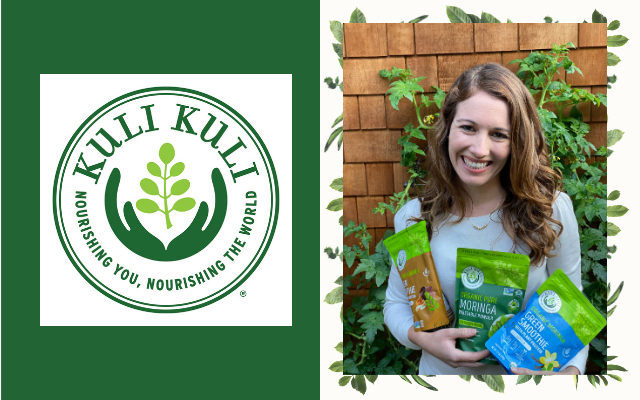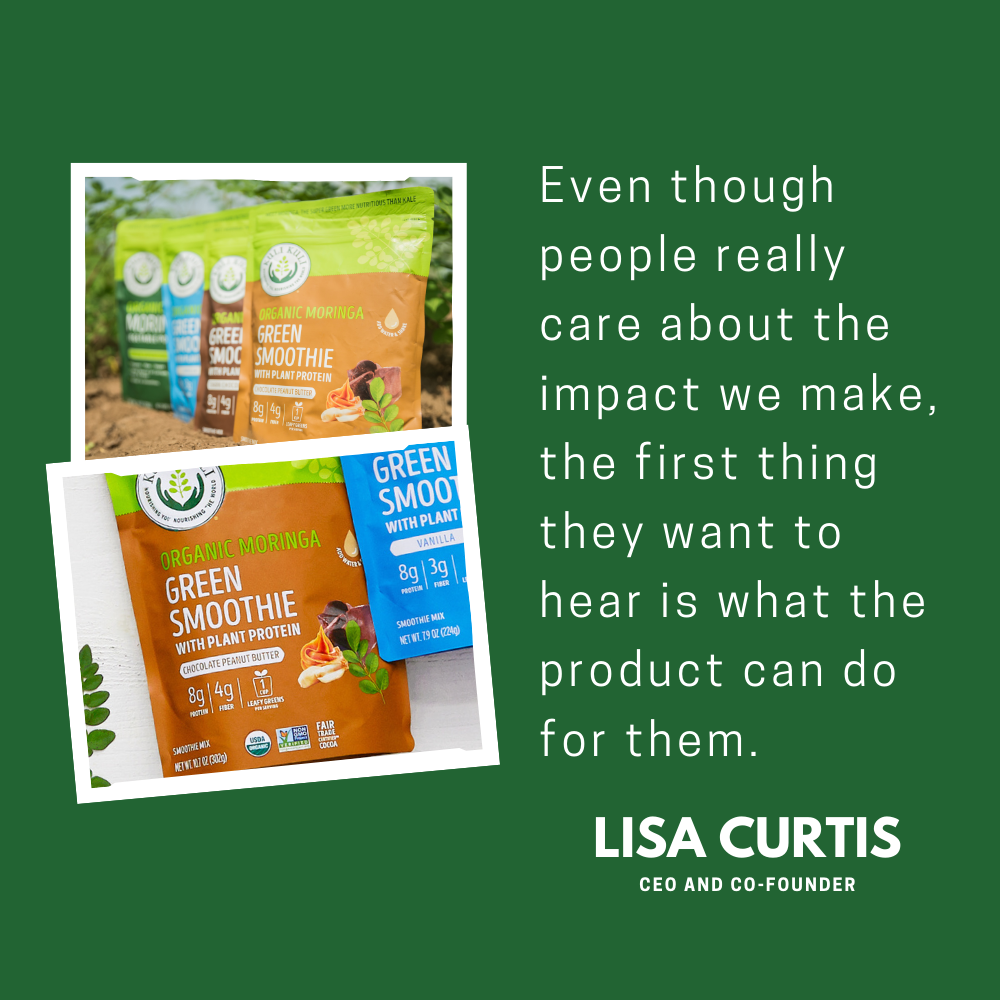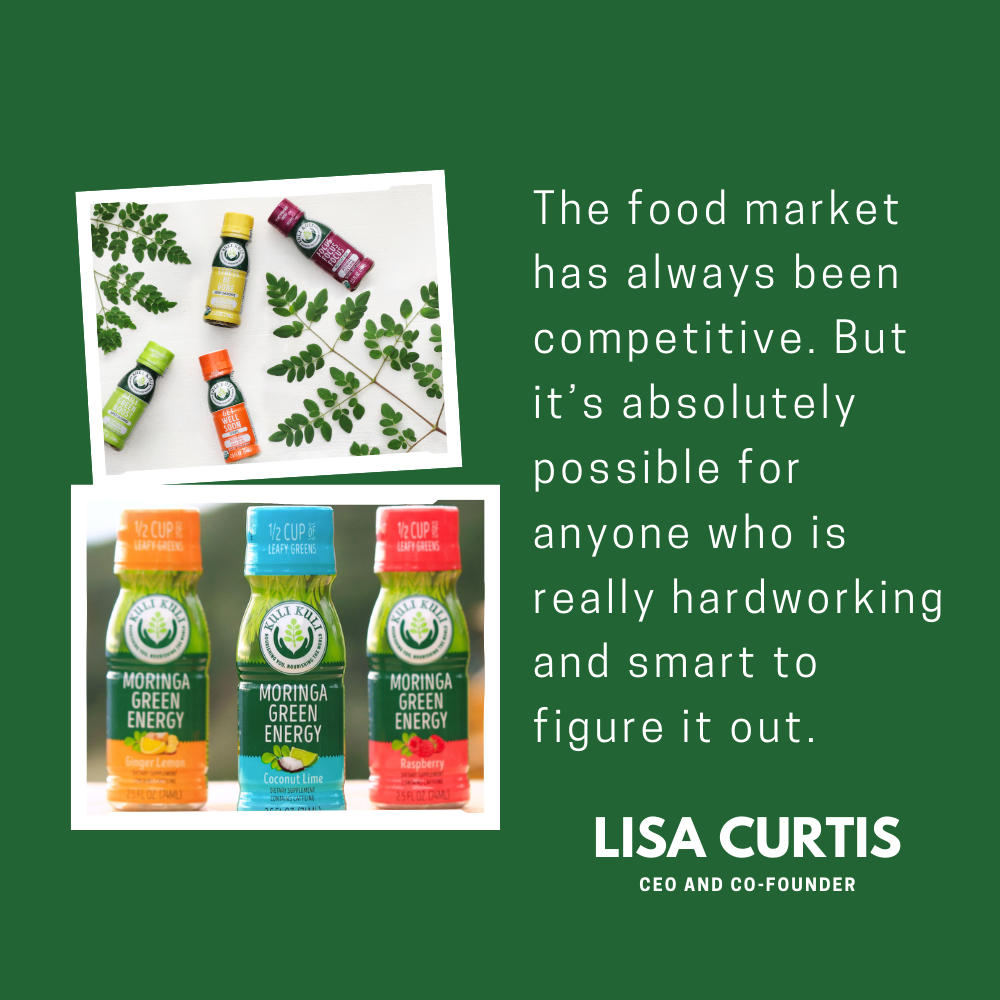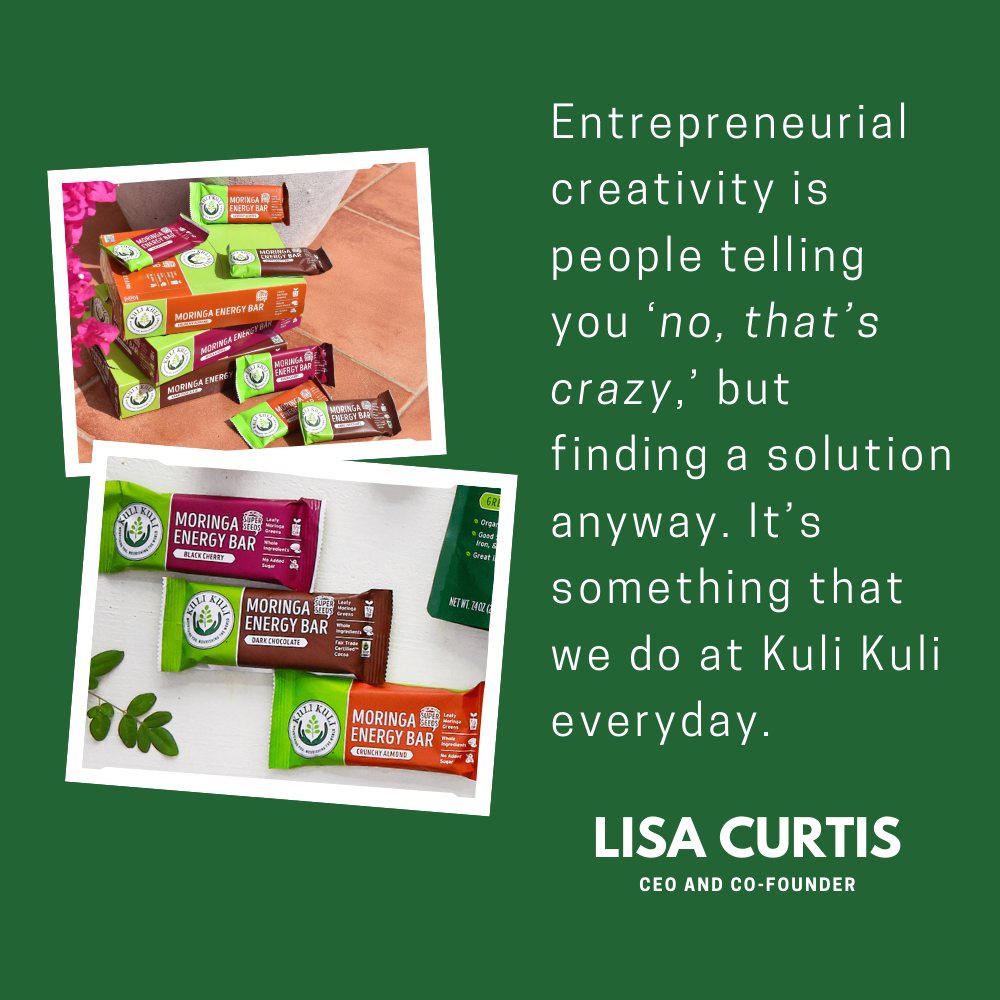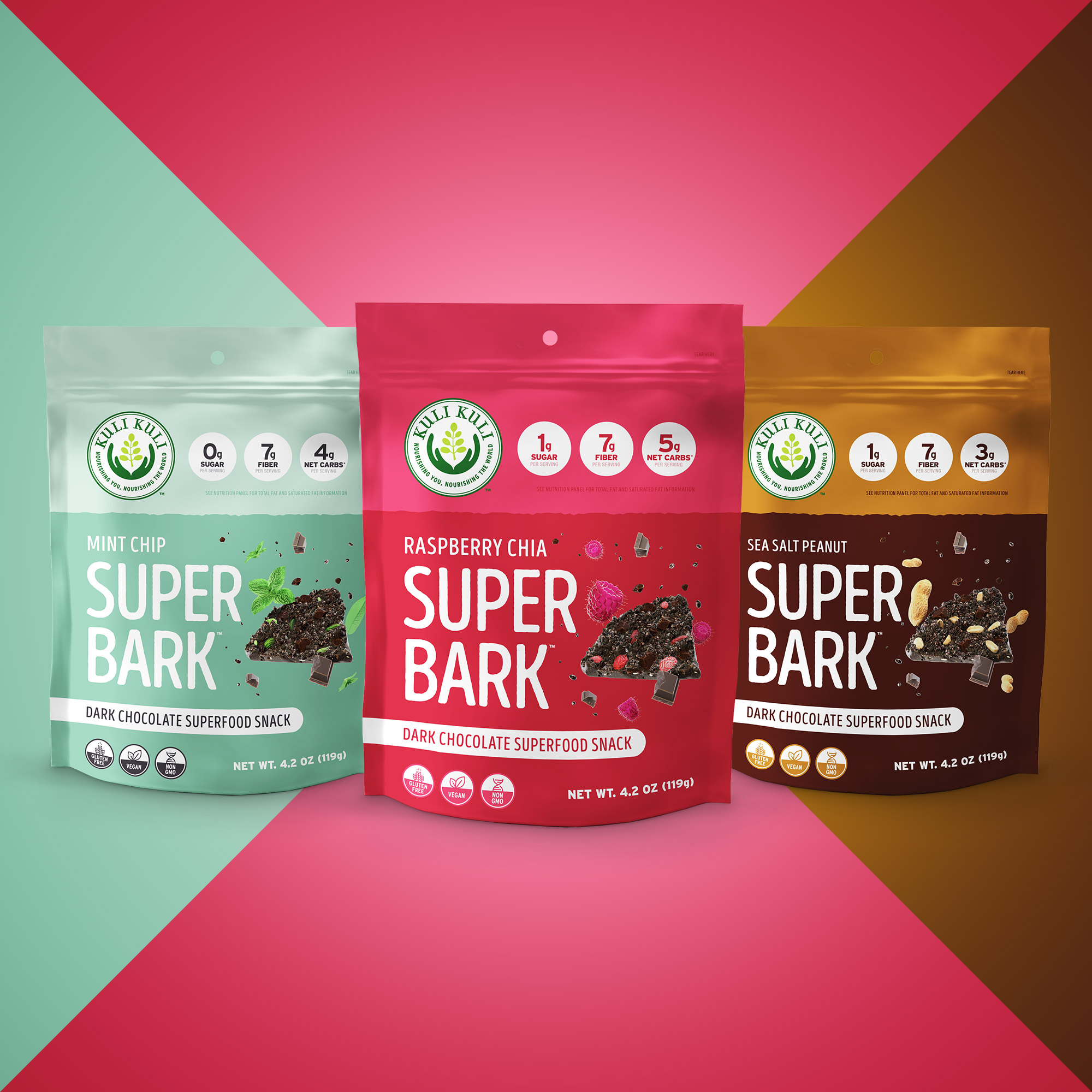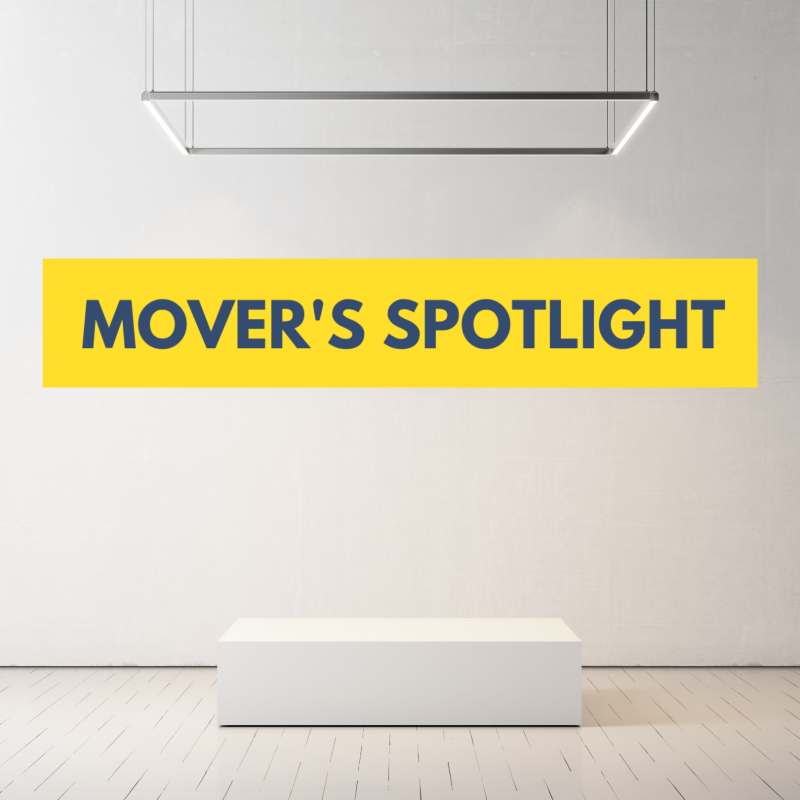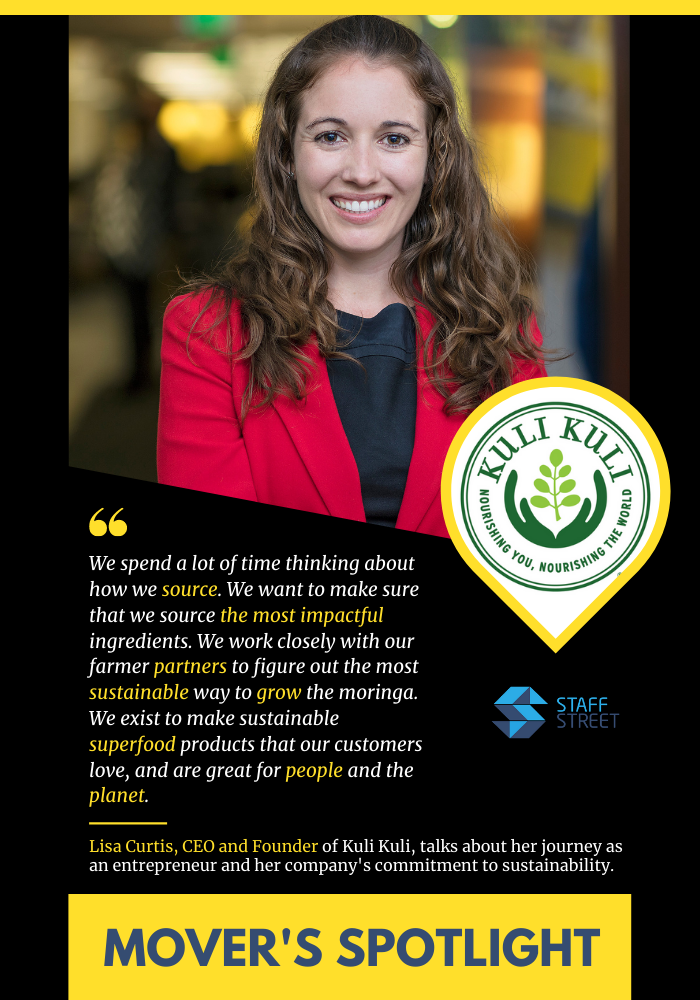
I know that you served in the Peace Corps before you started Kuli Kuli. Can you take us back to the moment that you realized that you wanted to start a business? What made you want to start Kuli Kuli?
Lisa Curtis: I started Kuli Kuli after serving as a Peace Corps volunteer in Niger and West Africa. I became interested in moringa originally for myself. Early on during my service I felt that, as a vegetarian, I wasn’t getting enough nutrients in my diet. So, I asked the local women in my village what I could eat so I could feel more energized. In response, they literally reached up and pulled these moringa leaves off a tree and mixed them into this popular local peanut snack called kul-ikuli. They said, “Eat this. It’ll make you feel better.” And it did! It made me feel so much more energized, because the protein, calcium, and the vitamins I was lacking were all there.
I asked the women what I could do to help them grow and use more moringa locally. They wanted to figure out a way to sell it, because they weren’t going to grow crops they weren’t going to sell. So, I said, I would help them sell in the U.S. Long story short, Kuli Kuli is now the leading brand selling moringa products across the country.
Kuli Kuli offers organic moringa powdered drinks and snack bars. Moringa is a superfood. Can you tell us a little bit more about why people should consider making it part of their diet?
Lisa Curtis: I think moringa is great for everyone. It’s packed with protein, calcium, iron, vitamins – it’s one of the most nutritious plants in the world. People find that it gives them a naturally energizing effect. It contains caffeine-free energy and gives your body the nutrition it needs to thrive.
You spoke to Entrepreneur and Food Business News about spending your first year in business putting your brand out there in stores and giving your snack bars out to people. What’s a key lesson from those early days of reaching out and finding your market that continues to shape the way you put your brand out there today?
Lisa Curtis: When you spend a lot of time talking to customers, you get a sense of what they like and they don’t like. I think it also helped me understand that even though people really care about the impact we make, the first thing they want to hear is what the product can do for them. That’s a good lesson.
Do you continue to engage your consumers in the same way?
Lisa Curtis: It looks a little different during COVID (laughs). But, yeah, absolutely. In an otherwise normal time, we do tons of events and we talk to our customers a lot. We’re trying to do more of that digitally.
You told Entrepreneur that you quote-unquote “Googled your way into building a business”. With virtually everyone turning to e-commerce in 2020, do you think it’s possible to do what you did and still get ahead when everything now is super competitive online?
Lisa Curtis: I think that the food market has always been competitive. It’s absolutely possible for anyone who is really hardworking and smart to figure it out. You don’t have to have a background in food or a background in business to launch a successful food company.
During COVID-19, it has become harder for newer brands to get recognized. It’s tricky and worth thinking about if you’re launching a new product. It can be really challenging to get your product in front of a buyer as a small brand.
I know that Kuli Kuli is more than just a health food brand. I know that there’s a mission behind Kuli Kuli. Can you talk about making sustainability central to your business model?
Lisa Curtis: It’s really important for us that we are selling sustainably made products that have a positive impact on people and on the planet. We spend a lot of time thinking about how we source. We want to make sure that we source the most impactful ingredients. And we work closely with our farmer partners to figure out the most sustainable way to grow the moringa. We really exist to make sustainable superfood products that our customers love, and are great for people and the planet.
Do you work only with the women cooperatives in Niger or do you source moringa from other places?
Lisa Curtis: We work with quite a few different countries to source moringa. Now, we’re focused on just five different moringa suppliers. We’re not as globally wide as we used to be. We want to go deeper in the countries that we source them from.
Working with these different women cooperatives from different countries, have you learned things from them that you think are worth sharing with entrepreneurs back home?
Lisa Curtis: Yeah, we’re always learning things from our suppliers. They’ve taught us about the different superfoods they’re growing and how they’re using them. We’ve learned a ton just from chatting with our suppliers all the time.
The biggest thing we’ve learned from our suppliers, especially in this past year, is resilience and the power of a positive mindset. Everyone around the world goes through different things. If you’re on lockdown in rural Uganda, the challenges are really different compared to what it’s like in California. But resilience cuts across different contexts.
So, this month, Mover’s Spotlight is focused on creativity. How do you define entrepreneurial creativity? What decisions have you made that speaks to your sense of creativity?
Lisa Curtis: I define entrepreneurial creativity as people telling you ‘no, that’s crazy,’ but finding a solution anyway. It’s something that we do at Kuli Kuli everyday.
Early on, we were working with one cooperative in Northern Ghana. A couple of months before we were supposed to launch, there was a huge wildfire and the whole cooperative burned down. We worked really hard to find alternative suppliers, who enabled us to move forward. To me, it speaks to the power of a solution-oriented mindset.
If you sit there and say, “This is never going to work. We’re done for.” Then, you’re done for. But if you work hard to find a path forward, you’ll find that there are a lot of ways to do that.
As a plant-based brand, did you guys gain a lot of traction during COVID-19 as more and more people shifted to healthier brands?
Lisa Curtis: I think people got very excited with anything with immunity and with supplements. We’ve had people like Martha Stewart and Naomi Campbell talk about moringa. More and more people are certainly more interested in healthy brands like ours.
If you could take a magic wand to any aspect of your business to help it grow better, what would that be?
Lisa Curtis: Top line revenue? (laughs) Revenue solves all the problems. When we have more sales, we can create a bigger impact, we can pay our team more, and we can do a lot of things. I truly believe in the mantra “no market, no mission.” If I can get one wish with this magic wand, that’s where I want us to grow.
What projects do you have in store for 2021? Where do you see your business headed in a year’s time?
Lisa Curtis: We just launched a superfood chocolate bark, which is an exciting new direction for us. We’ve gotten incredibly positive feedback on it. We’re excited to innovate and create products that our customers really love. In a year’s time, we want to break even further into the snacking category and pioneer other superfoods and show what they can do.
